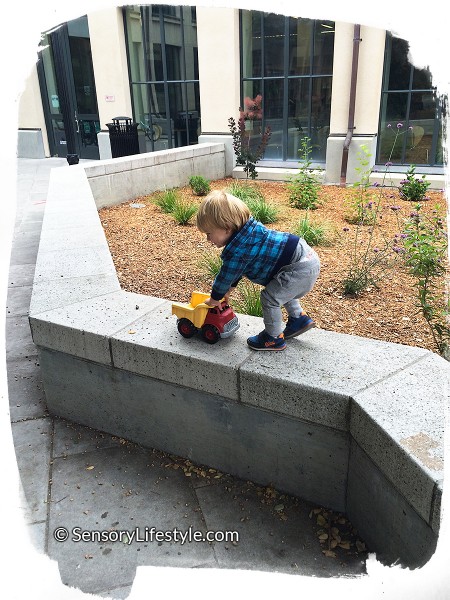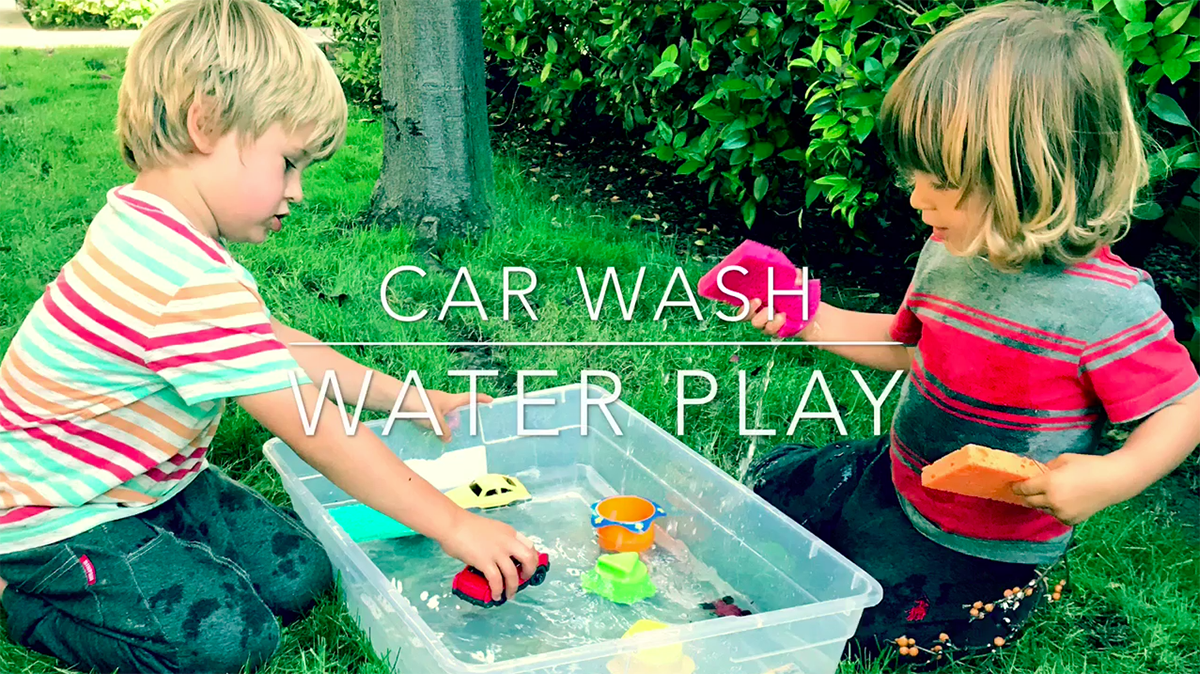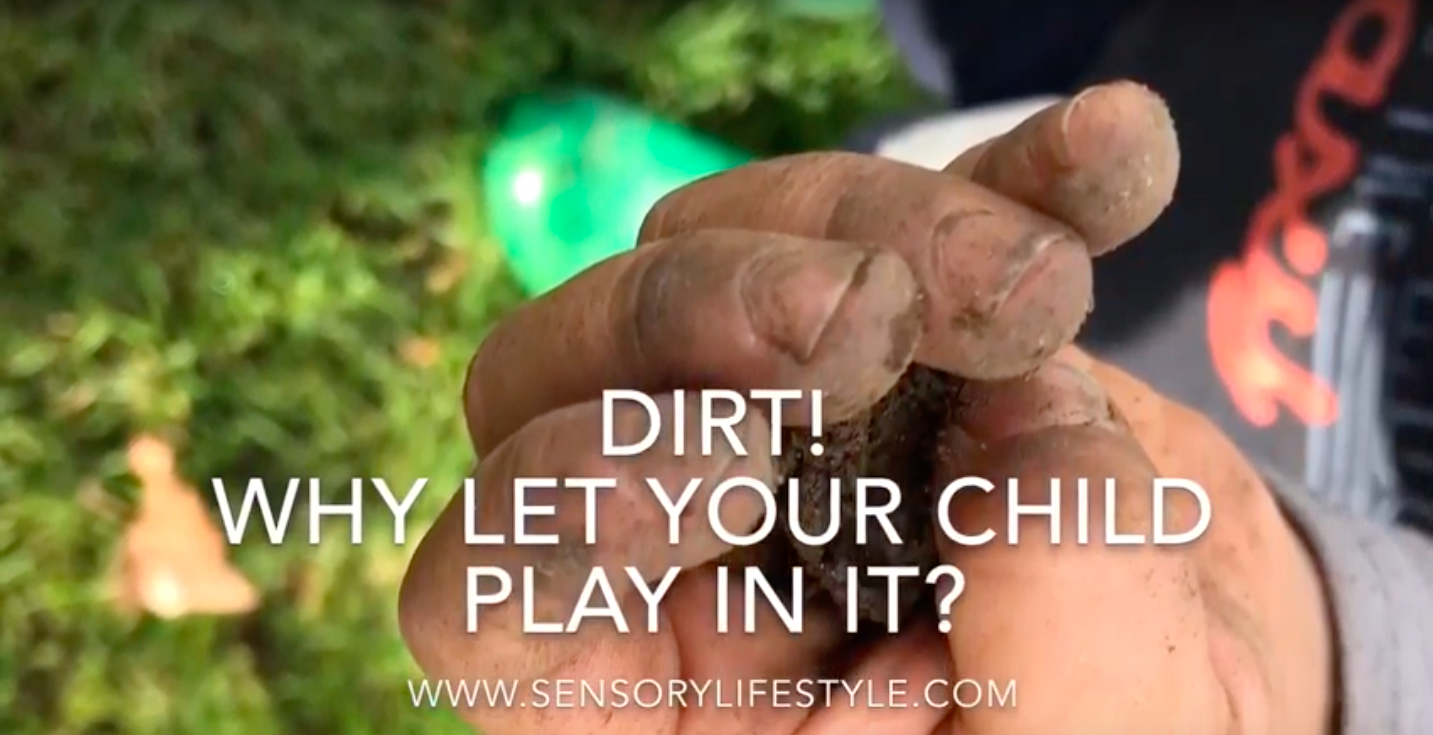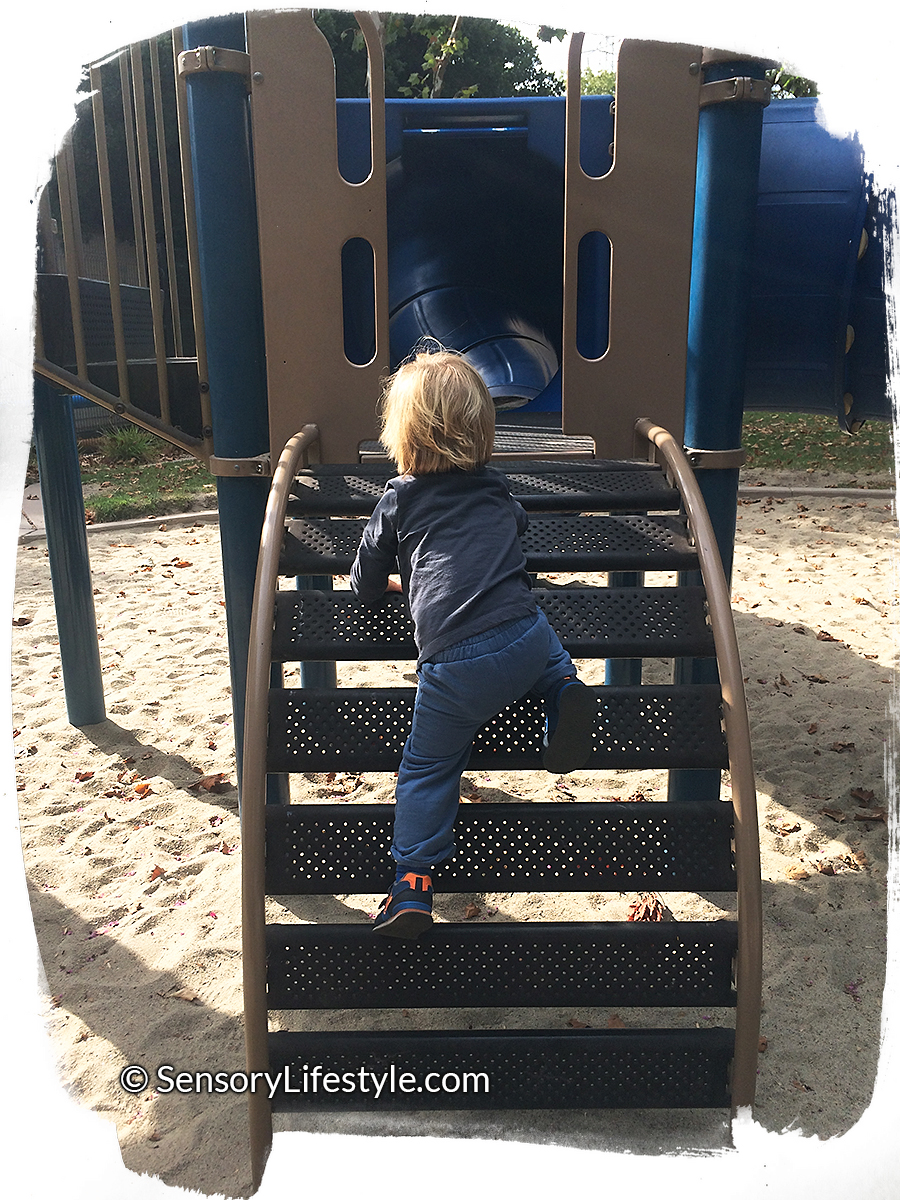Month 17: Top 10 Sensory Activities for 17 month toddler
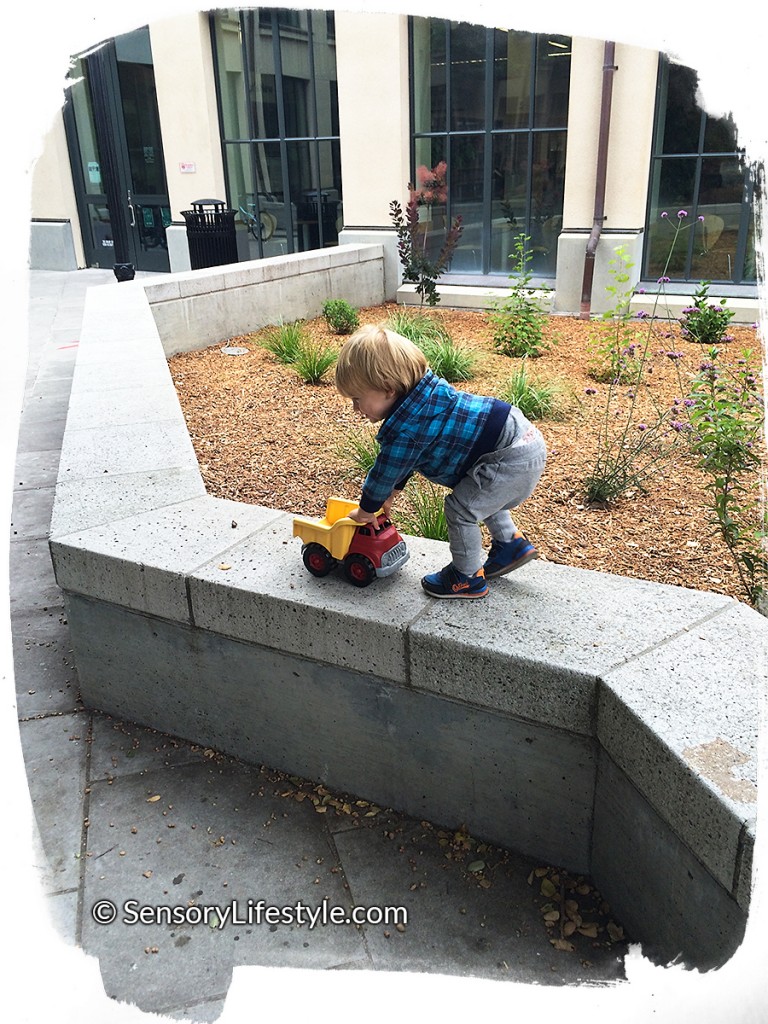
8 min read
As an Occupational Therapist and a Mom I have put together top activities for your 17 month old toddler. These activities will focus on strengthening their cognitive (mind) and motor (movement) development.
Vroom vroom vroom… oil pressure.. check. vroom vroom.. turbo pressure.. check.. engine purrs.. the friendliest sound you’ve ever heard.. I love my yellow dump truck. We are getting ready for a big adventure outside with mum.
Ok it’s GO time. I put the truck into forward gear, the invisible turbo comes on boost. I know it’s there 😉 and we are off and away… My mission is to explore the local neighborhood.
As I storm past, the local hood fat cat gives me his orange thumbs up. I see an army of squirrels aligning themselves on the power lines ahead. Nothing will stop me and my truck. We come flying past them taking a sharp turn to the left on a narrow path that opens wide up ahead. The path is clear. I can smell the fresh flowers blooming all around me.. oh wait.. there’s a bzzzzz.. and another.. bzzzzz… wow those bees are busy today.
Behind me, I see mum chasing me. Time to kick it up a notch and move like The Flash. Another sharp turn left. Yeah this is going smoothly. In the distance a glimmer of yellow paved road shines.. it is covered with little yellow speed bumps. Is this for me to slow down? I doubt it. Dad always says go all the way or go home. I aint going home yet. And neither is my truck. Bump bump bump.. ohhh.. this is different. I have arrived on the yellow bumps, they are definitely here to slow me down. Ohh the vibrations are also relaxing. Yeah this is pretty sweet.
As mum catches up to me I give her this opportunity. No sooner I spot another adventure. A gigantic wall. Up we go. I was a little nervous at first but my truck and I went up it just fine. I walked slowly to make sure I didn’t lose my balance. It is a long way down if I fall. My mum is watching me closely but I don’t want to give her any reason to interrupt me. ‘Made it to the end!’ I turn around and I see my mom’s big smile. I think she is just as proud of me. OK … so how do I get down from here? So much fun. I can’t wait to do it all over again tomorrow.
Josh has so much fun on his outdoor adventures. From the above story you can see how many different challenges your toddler can encounter when being outside. During Josh’s adventure all his senses were hard at work.
Here are my top 10 sensory activities for your 17 month old toddler. As always, these activities have been tried-and-tested.
Activities for your 17 month toddler
1. Exploring the outdoors
This is a must do activity with your 17 month old toddler. It has endless benefits that can target all of your toddler’s senses. As their sensory system develops, they strengthen all their skills including visual, fine and gross motor skills.
Exploring the outdoors can be as easy as going for a walk around the block or visiting a park, playground or a beach. You will notice that your toddler makes frequent stops to interact with his or her environment or to observe it. Remember not to rush them so they don’t miss out on an opportunity to learn.
Get excited with them about the spotted squirrel. Encourage them to pick up those dry leaves and then rip them into pieces. Allow them to get wet in puddles and dirty in the mud. Let them push their strollers, carts or trucks over different surfaces. So many fun play opportunities as you wonder and explore.
To get more detail about the benefits and play ideas check out my post on Exploring the outdoors.
2. Stop & go games
Stop & go games are excellent to start teaching your toddler about impulse control.
How to Play
Incorporate stop & go language into your toddler’s favorite games.
Rules: While playing a specific activity say ‘stop’… wait… wait and then say ‘go’ and keep on playing.
After your toddler understands the concept you can prolong the wait time. Just enough to keep them engaged but not frustrated.
Examples of games:
- Ball bouncing: While bouncing on a large exercise ball
- While walking outside
- Whilst walking your toddler in a stroller
- While giving them a piggy back on your shoulders
- Whilst pouring water into the bathtub or onto your toddler
- And so on…
3. Adventures with beads
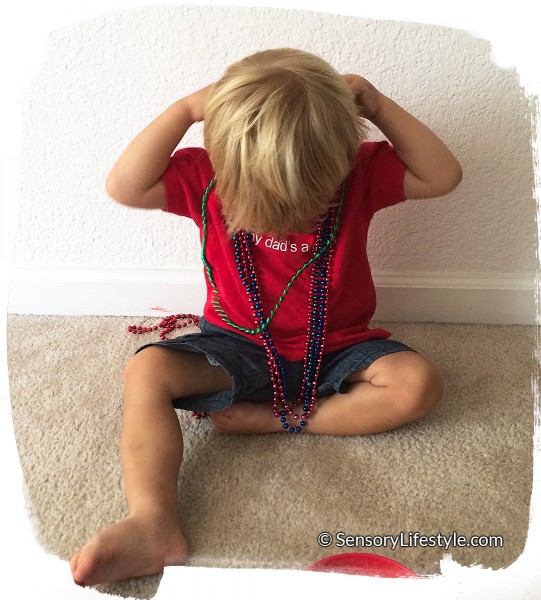
| Skills Developed | Targeted senses |
|---|---|
| Fine motor skills, eye hand coordination, crossing midline | Tactile, proprioceptive & visual senses |
How to Play
Equipment needed: bead necklaces, various containers.
So many fun things one can do with the bead necklaces. Try the following ideas with your toddler:
- Sorting them into containers according to the colors
- Pouring them into a container
- Tipping them out
- Putting them on and taking them off their neck
- Walking over them with their bare feet
- Rolling different toys over them
Occupational Therapy Tips:
Encourage crossing midline. This can be done by positioning beads to the side of their body. As they go for the beads encourage grasping them with the opposite hand. For example use right hand to grasp the necklaces on the left side of their body and vice versa.
What is crossing midline?
We all have an imaginary midline running down the center of our bodies. In order for us to effectively coordinate both sides of our body we need to be able to cross that imaginary line.
Being able to cross your midline assists with developing hand dominance and bilateral coordination (ability to use both hands).
4. Zippers and Buckles Play
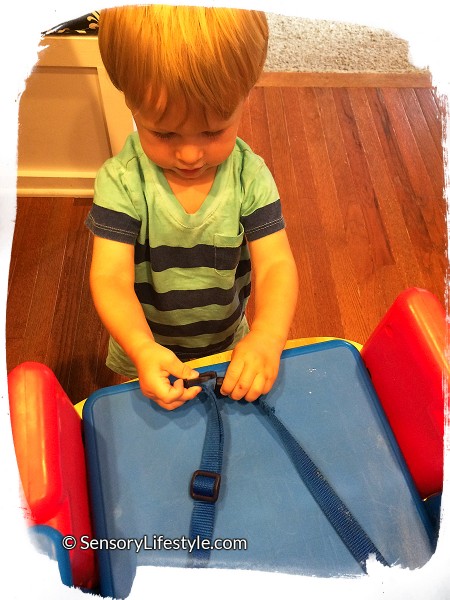
| Skills Developed | Targeted Senses |
|---|---|
| Fine motor skills (manipulation and strengthening), eye hand coordination | Tactile, vision & proprioceptive senses |
How to Play
Provide opportunities for your toddler to close and open zippers and buckles.
Zippers: Use suitcases, bags or cushion covers with zippers. Show your toddler how to grasp and pull the zipper. You can even hide surprises in the suitcases or bags for that extra excitement.
Buckles: It may be too hard to open the buckles at this age but closing them is just as fun. They can practice this skill using buckles on high chairs, shopping trolleys, strollers or dressing toys and puzzles.
5. Pinch and lift games
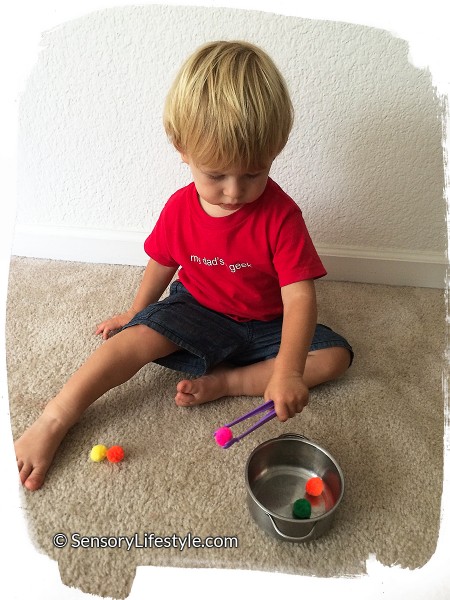
| Skills developed | Targeted Senses |
|---|---|
| Fine motor skills (manipulation & hand separation), eye hand coordination | Vision, tactile & proprioceptive senses |
How to Play
Grab some tongs, containers and pom poms. Teach your toddler how to hold and squeeze tongs. Then let them experiment by picking up pom poms and transferring them from one container to the next.
Pom poms are great as they can be squished and won’t slip away when picked up.
6. Messy Play: Fun with mashed potatoes
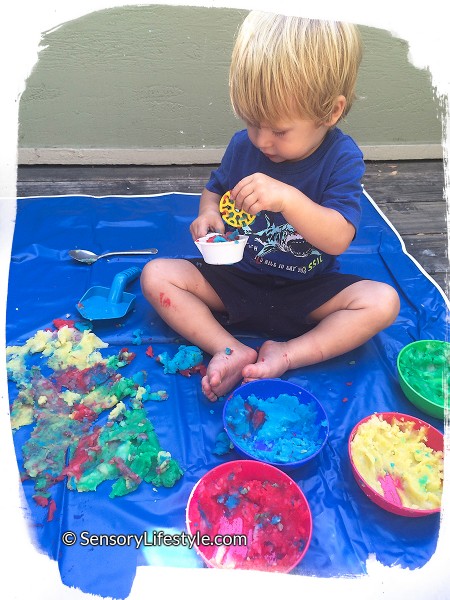
| Skills developed | Targeted senses |
|---|---|
| Fine motor skills, eye hand coordination & motor planning | Tactile, visual & proprioceptive senses |
How to Play
Equipment: mashed potatoes, food coloring, variety of containers and utensils.
First, boil your potatoes. Then mash, and add food coloring. I like to divide the potatoes so I can use more than one color. It is also fun watching them mix them up and see how colors change.
When mashing the potatoes, don’t worry about doing a perfectly smooth mash. A few lumps are good for the extra sensation.
You can get really creative with what you can do here. Some examples include:
- Explore with hands
- Explore with feet
- Manipulate the potatoes with a variety of objects or utensils
- Move between containers
- Find hidden objects
- You can create large balls/towers/shapes and they can squish and destroy them
7. Sorting
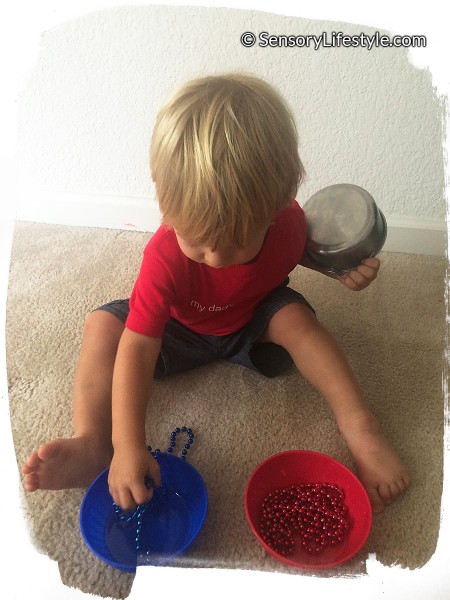
Let’s get your toddler familiar with ‘same’ and ‘different’. This can be done through sorting different objects. It’s best to start sorting either by colors or shapes.
All you need are objects that you want sorted and containers to put them in.
If sorting by color ensure you have containers of different colors. Another option is to cut out colored paper or color the bottom of the containers.
If sorting by shape, its best to place one of the objects into the container for a physical prompt.
So how to get started?
Example: Sorting by colors
1. Prepare your containers and objects that your little one will be sorting.
2. Start with no more then 2 colors. Let’s say blue and red.
3. Place blue objects in front of the blue container and red objects in front of the red container. This will help with the color association. Make sure you also name the colors. This will need to be repeated throughout the activity.
4. Start practicing sorting in this set up.
5. Once they master above set up you can mix up the colors.
6. Then you can start adding more colors
Have fun and don’t rush it!
8. Lacing
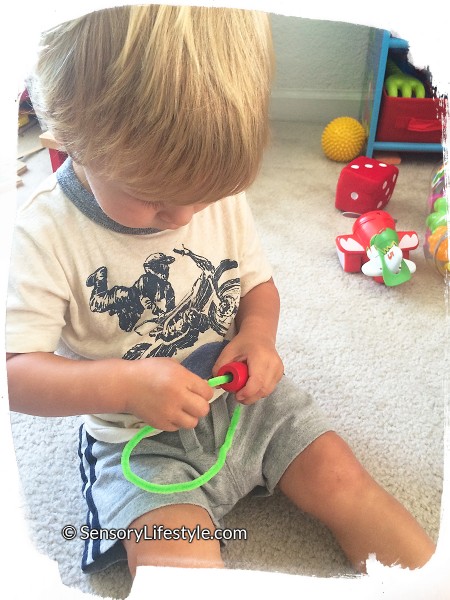
| Skills developed | Targeted senses |
|---|---|
| Fine motor skills & eye hand coordination | Tactile, visual & proprioceptive senses |
How to Play
Equipment: Large lacing beads or dry penne pasta, pipe cleaners
This is a great fine motor activity for your 17 month old toddler. However, lacing requires lots of skill so ensure you give your little one time to practice. Grading is the key to this task. At this age the traditional lacing beads and string will be too hard to manipulate.
So, if you have some lacing beads at home put the string to the side. Take out some pipe cleaners and use those instead. These will make it much easier for your toddler’s hands to manipulate and succeed.
Don’t have any lacing beads at home? Not a problem! Grab some penne pasta from your local supermarket and get your toddler to lace them instead.
To teach them, find a quiet place to help your toddler’s focus. Show your toddler how to do it by demonstrating it to them. If they are unable to succeed with your demonstration, you may try hand over hand to get them started.
9. Get to know your emotions
It is very important for your child to have a large emotional vocabulary. This includes both positive and negative emotions. By being able to name and recognize an emotion you are able to better understand it. When you understand your emotions you can then regulate them better. Research shows that children with behavioral difficulties know less “feeling” words. This means: let’s talk emotions to reduce behavioral difficulties later on!!
At this age you are just starting to build foundations. Don’t expect your toddler to be able to recognize their emotions yet. However, start making it a habit to name emotions around and to your toddler. Here are few ways of how to do it:
- Label different feeling when reading books. Any book will do.
- Use specific feeling books such as ‘When Sophie Gets Angry‘, ‘The Way I Feel‘ or ‘On Monday When It Rained‘
- Label your own emotions as you experience them.
- Label your toddler’s emotions as they experience them.
- Make sure you always include both negative and positive emotions.
10. Fun with balls
| Skills developed | Targeted senses |
|---|---|
| Gross motor skills including balance, eye foot coordination & eye hand coordination | Tactile, visual, vestibular & proprioceptive senses |
How to Play
To keep your little one motivated, it’s nice to have different types of balls. You can have small and large balls. You can also play with light and heavy balls. Each ball can challenge your toddler in different ways.
For example, when using balls of different weights, your toddler will be using their proprioceptive sense. This sense will help them figure out how much force is required to hold, throw and kick a ball.
What to do with the ball? The sky is the limit! You can start with throwing and kicking. You can play indoors or outdoors. Throw or kick the ball to each other or at a target. Maybe they can throw at something that can be knocked down. Things such as empty plastic bottles are great.
Have fun and keep expanding on the above ideas. Remember to follow your child’s lead.
Summary
There you have it. My top 10 Sensory Activities for your 17 month old toddler. These are bound to spark up other ideas. Let me know what activities you have tried in the comments section below.
Remember: Each child develops at their own pace. If your child is not ready or not interested in this month’s activities, just try them again in a few weeks.
~ Urszula
Disclaimer: The activities in this blog are intended for sensory play. They are not a replacement for treatment of children with Sensory Processing Disorder, are not medical advice and should not be used in place of the care of a medical doctor or other qualified healthcare professional. These activities should be facilitated and supervised by an adult. All activities are to be performed at your own risk and in no event shall Sensory Lifestyle be liable for any damages.
| ❮ 16 month activities | 18 month activities ❯ |
